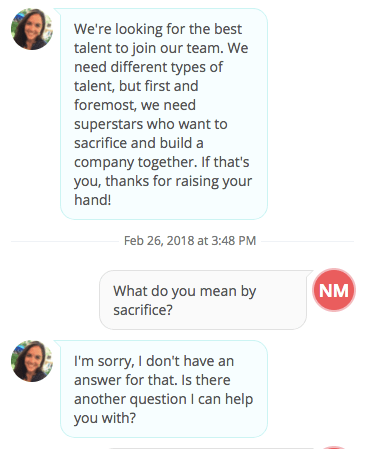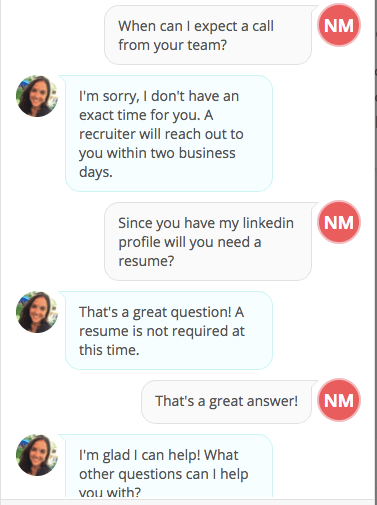
I’m pretty obsessed with HR tech. Right now I’m examining HR chatbots. Chatbots are becoming ridiculously popular in HR because they save recruiters valuable time. Candidates are comfortable with them too. SHRM reported that 57% of survey respondents confirmed they were fairly or extremely comfortable interacting with AI bots in the recruiting process. In an ideal world the chatbots deliver a premium candidate experience, giving everyone the opportunity to engage with the company.
I’ve been trying to get a look at Mya, the chatbot that interviews you, analyzes and scores your responses, and does the heavy lifting for recruiters. I really really really want that damn bot to interview me in part because I have a crush on its conversational design technology and because I secretly want to be a part time conversation designer.

But I can’t get Mya to interview me yet as I’m not exactly qualified for their jobs, so no bot access.
Luckily I stumbled on a chatbot for TalkPush, which is a HR chatbot company that makes it easier for recruiters to source. Here’s their pitch:
TalkPush is the first conversation-driven Candidate Relationship Management (CRM) system. On Talkpush, recruiters spend more time talking to qualified candidates, which translates into a better candidate experience and huge reductions in cost-per-hire and time-to-fill”
TalkPush has received about $1 million in funding. Compared to Mya, which has received $34 million and on its Series B funding, TalkPush hasn’t gotten much of that sweet 2 billion dollar plus HR tech funding pie.
Regardless I’m on a mission to try out hiring chatbots and TalkPush made it easy. You can access their recruitment bot from the homepage but you’ll be required to give access to your FB page, an offputting ask since we literally just met (what are you doing with that data?).
However their jobs page gives you access to their bot without having to give over your FB access.
The interaction starts simply enough.


I was a bit put off by the questions about contact info before I even got to see the jobs. Then again I’d submit this info on a resume, so I suppose it evens out in the end.
There were also a few typos in the exchanges. I thought it reflected poorly on the company since in the US, typos result in the immediate death of your candidacy for employment. Then I found out the company is based in Hong Kong and China, so the conversation is likely written by a non-native speaker. Makes sense now (I see an opp for some talented bilingual interns!)
But then the experience gets a bit lame.

This wasn’t so much a conversation as it is a display of information. After I asked what a (Demo) Job Position is, I got nothing. Radio silence. So I checked in.

Aaaaand it seemed like we were back at the beginning. This reminded me of the awkward experience I had with IBM Watson’s chatbot. So I typed in an alternative job. Then we were back on track. Interestingly I was supposed to tell them about my relevant work experience. I wondered what they meant by that. Should I write paragraphs? Is this the place for a short, two-sentence summary of my qualifications, similar to what I’d write in a cover letter intro or say to a recruiter on the phone? Should it be a list of companies? Positions? Software? Skills? Am I being evaluated on the time it takes to answer questions, similar to video interviews? I had no idea. So I just added some fuckery to advance the convo and see the other questions.


As you can see I wasn’t a good candidate. But the questions were interesting reminded me of an initial phone interview.
The flow and expectations in this exchange are a bit problematic though. As a job seeker, I may not have samples of my work or a summary of my work experience on hand during the chat interview. Since I had to put in my contact information before I saw the jobs, it’d be hard to take a break, go get that information, and return to the bot to continue the conversation. Usually a candidate takes a look at a job, builds the required documents based on the job, then returns to submit. This experience was like an application and phone interview in one.
Also the inability to engage at times makes me wonder what candidates should do when a bot fails. Any interaction with an employer should be considered evaluative. This leads to questions about best practices for candidate behavior. What should a candidate do if they’re stuck engaging with a bot? If the chatbot fails, what are the next steps for the candidates? If the chatbot misunderstands their information or can’t answer a question, does the candidates get bumped to a human? Can a candidate press 0 or some magical combo to get a live human?
If I were advising a candidate, I’d tell them to take screen shots and contact a recruiter directly with questions. It’d work in the candidate’s favor maybe. It could show that the candidate is a proactive, problem solving candidate. And it’d (hopefully) help the team improve their bot.
So for all job seekers out there: brush up on your professional written communication skills. You’re going to need them beyond writing cover letters to get past the bots.


















